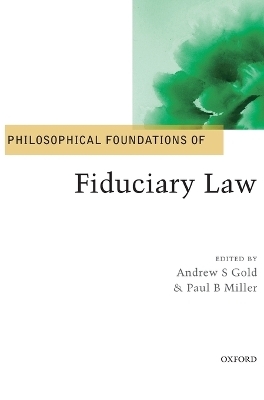
Philosophical Foundations of Fiduciary Law
Oxford University Press (Verlag)
978-0-19-870172-9 (ISBN)
Fiduciary law is a critically important body of law. Fiduciary duties ensure the integrity of a remarkable variety of relationships, institutions, and organizations. They apply to relationships of great personal significance, including in some jurisdictions the relationship between parents and children. They structure a wide variety of commercial relationships, and they are essential to the regulation of relationships between professional service providers and their clients, including relationships between lawyer and client, doctor and patient, and investment manager and client. Fiduciary duties, perhaps uniquely in private law, challenge traditional ways of marking the boundaries between private and public law, inasmuch as they figure prominently in public governance. Indeed, there is even a storied tradition of thinking of the authority of the state in fiduciary terms.
Notwithstanding its importance, fiduciary law has been woefully under-analysed by legal theorists. Filling this gap with a series of chapters by leading theorists, this book includes chapters on: the nature of fiduciary relationships, the connection between fiduciary duties and morality, the content and significance of fiduciary loyalty, the economic significance of fiduciary law, the application of fiduciary principles to public law and international law, the import of fiduciary relationships to theories of authority, and various other fundamental topics in the field. In many cases, new and important questions are raised by the book's chapters. Indeed, this book not only offers a much-needed theoretical assessment of fiduciary topics, it defines the field going forward, setting an agenda for future philosophical study of fiduciary law.
Andrew Gold is a Professor at the DePaul University College of Law. His recent scholarship has focused on fiduciary theory, contract theory, civil recourse theory, and corrective justice. He has been a Visiting Scholar at Harvard Law School, and an HLA Hart Visiting Fellow at the University of Oxford. He is also a co-founder of the North American Workshop on Private Law Theory. Paul B. Miller is Assistant Professor at the McGill University Faculty of Law. He is a philosopher of private law concentrating on fiduciary law, trusts, corporate law, and the law of unincorporated organizations. He formerly served as a law clerk to the Hon. Justice Ian Binnie of the Supreme Court of Canada and taught law at Queen's University. He is also a co-founder of the North American Workshop on Private Law Theory.
PART I. FIDUCIARY RELATIONSHIPS ; PART II. FIDUCIARY DUTIES ; PART III. ECONOMIC THEORY: CONSTRUCTIVE AND CRITICAL PERSPECTIVES ; PART IV. FIDUCIARY PRINCIPLES IN CONTEXT: PRIVATE LAW ; PART V. FIDUCIARY PRINCIPLES IN CONTEXT: PUBLIC LAW
| Erscheint lt. Verlag | 14.8.2014 |
|---|---|
| Reihe/Serie | Philosophical Foundations of Law |
| Verlagsort | Oxford |
| Sprache | englisch |
| Maße | 179 x 253 mm |
| Gewicht | 944 g |
| Themenwelt | Geisteswissenschaften ► Philosophie |
| Recht / Steuern ► Allgemeines / Lexika | |
| Recht / Steuern ► EU / Internationales Recht | |
| ISBN-10 | 0-19-870172-1 / 0198701721 |
| ISBN-13 | 978-0-19-870172-9 / 9780198701729 |
| Zustand | Neuware |
| Haben Sie eine Frage zum Produkt? |
aus dem Bereich


